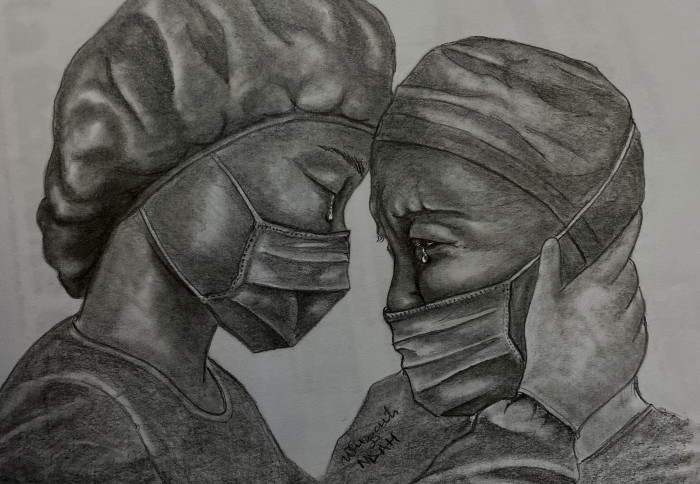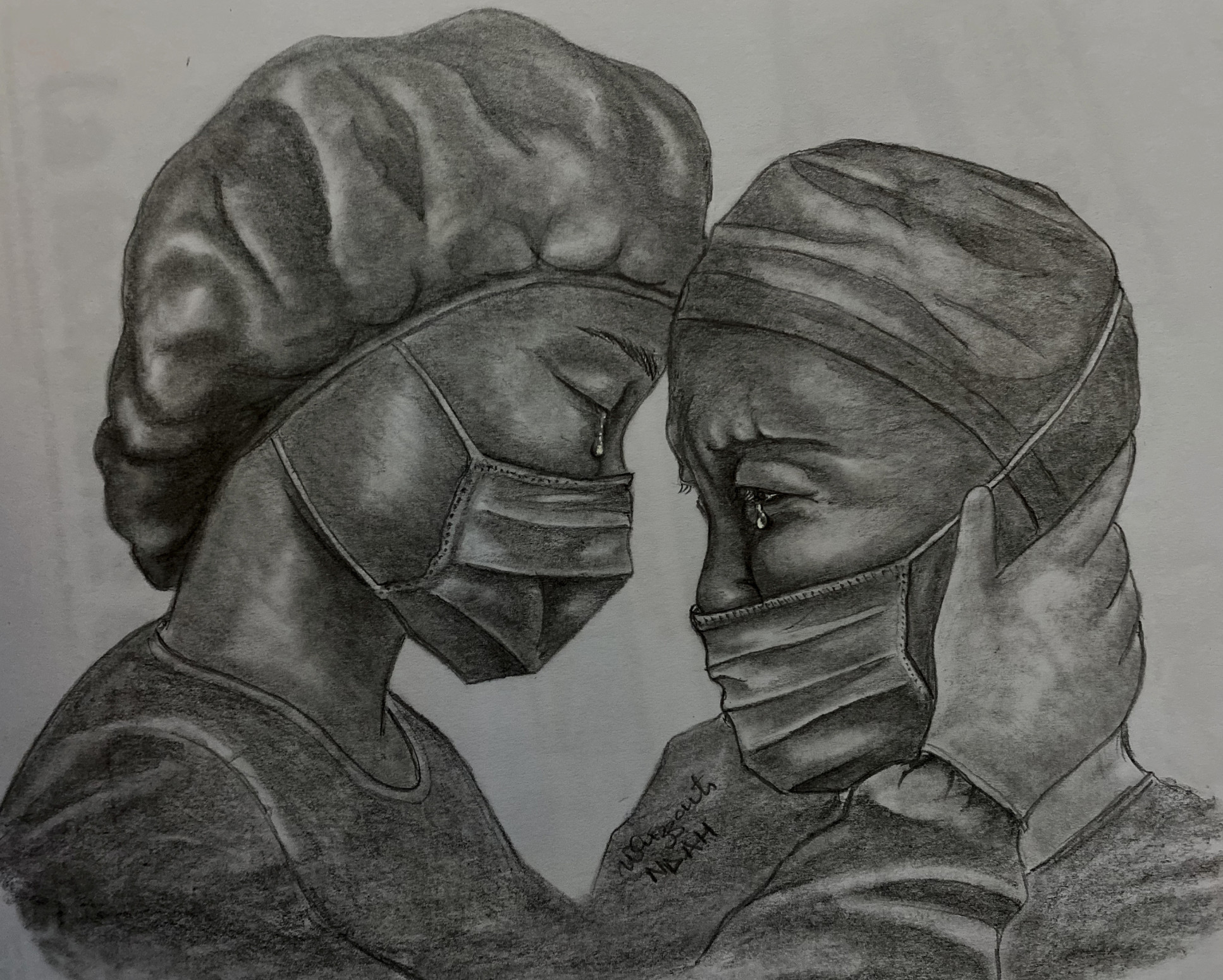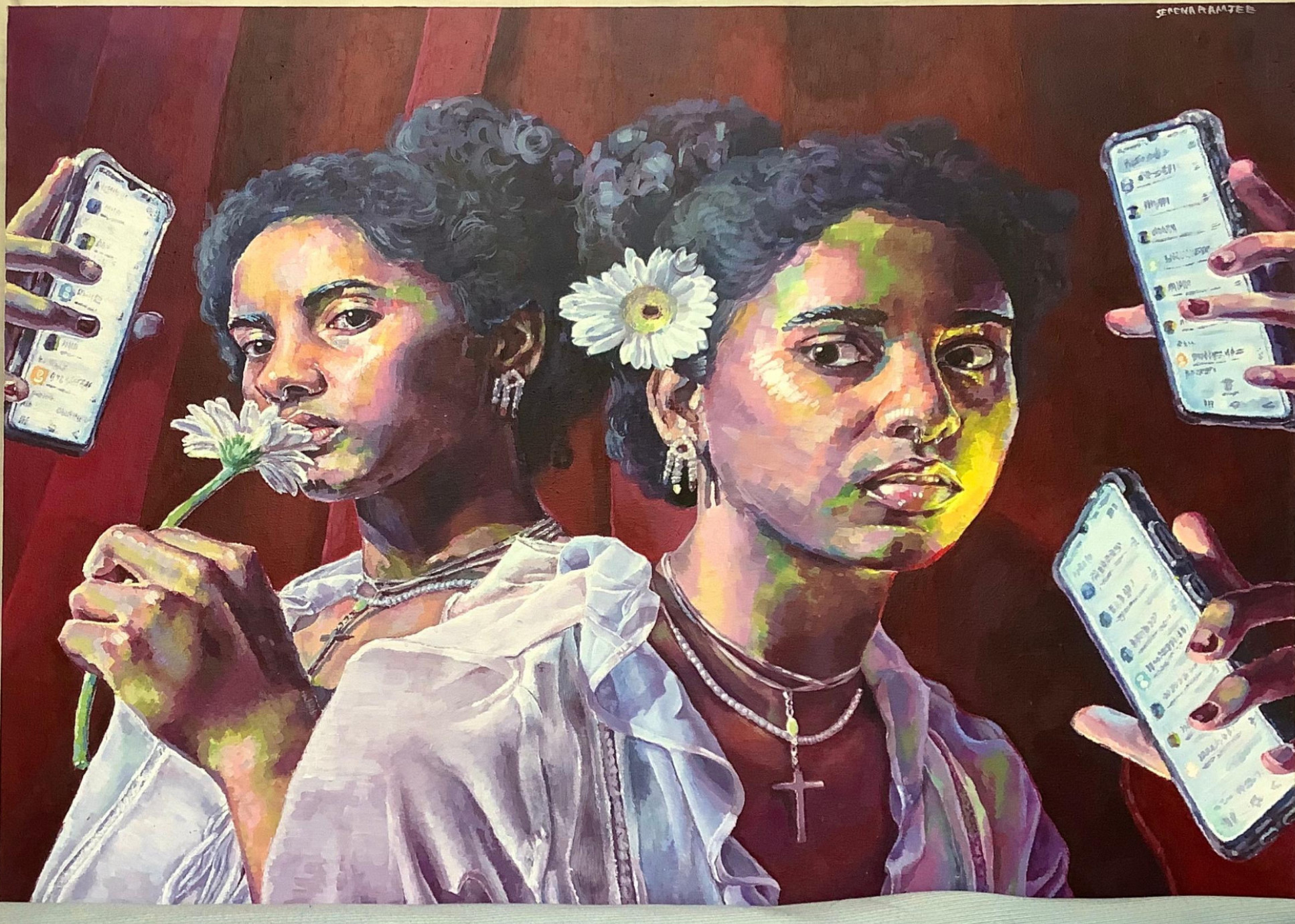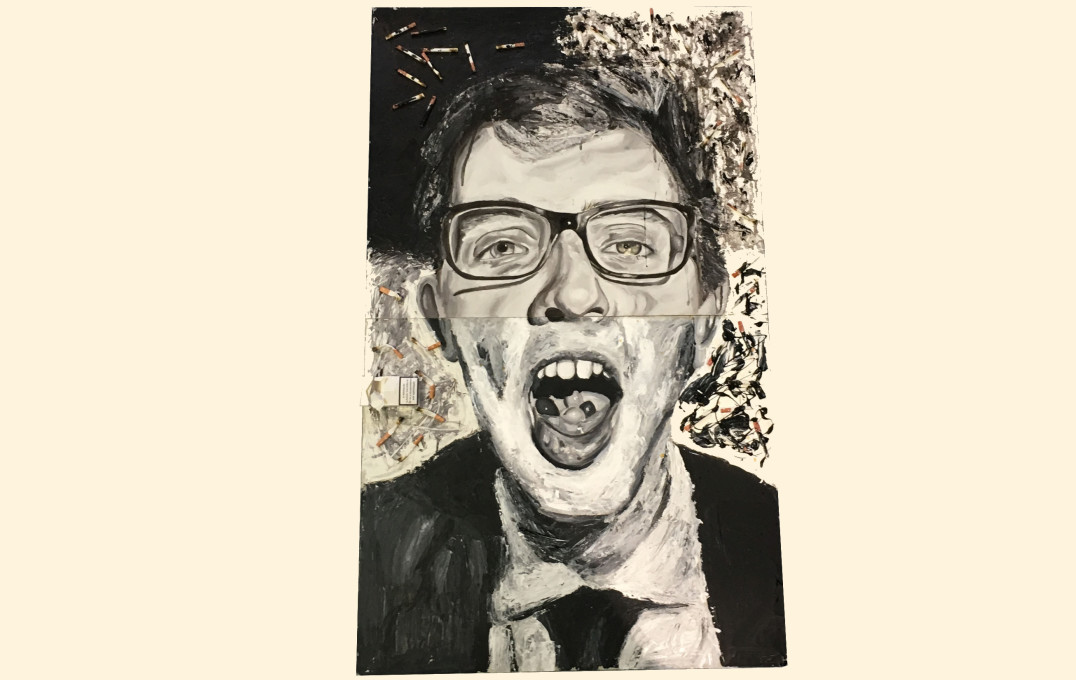Students share creative response to global pandemic
by Jack Stewart

Medical students from around the world have shared their creative responses to the COVID-19 pandemic in Imperial's first Global Creative Competition.
The Competition was launched in August by the Medical Education Innovation and Research Centre (MEdIC). It saw over 650 entries from 52 countries. The competition was inspired by a piece of art that Nour Houbby, a current medical student at Imperial, shared with Dr Sonia Kumar.
“The pandemic has had an unprecedented impact on all of us our jobs our lives our families. It really has touched all of us in so many ways around the world. At MEdIC we strive to bring together education and societal impact.” Dr Sonia Kumar, Director of Undergraduate Primary Care Education and MEdIC in the School of Public Health
“We wanted to provide a platform for medical students around the world to come together to reflect and share their personal and professional experiences during this challenging time.”
The entries were assessed by an expert panel of judges including Professor Dame Parveen Kumar (Queen Mary University of London and Author of Kumar and Clark), Rosamund Lupton (Sunday Times Bestselling author), Nour Houbby (Medical student, Imperial College London), Professor Ashley Hall (Professor of Design Innovation, School of Design, Royal College of Art) and Dan Simpson (Poet in Residence, Imperial College London) with the winners revealed at an event on Wednesday 14 October.
Visual Category
Winners
 Shielding
Shielding
Megan Knock
Oxford University, United Kingdom
Megan's reflection:
"My painting shows an image of my Great Aunt looking out of the window as she remained inside. It aims to highlight the drastic flip of life those shielding had. She looks through the window, longing to return to normality, to breath the fresh air, to feel at ease once again. She leans close to the window, her glasses in her hand, hungry for the life that was. With the facemask wrapped around her chin, just like a necklace around the neck, the constant presence of coronavirus is illustrated. Volunteering to phone vulnerable patients over lockdown I felt for myself how shielding can variably impact people. I know as a future doctor it is paramount to not paint each patient with a broad brush, but to see everyone as a whole."

Thrive
Akelekeh Ndah
Faculty of Medicine and Biomedical Sciences, University of Yaoundé, Cameroon
Akelekeh's reflection:
"It seems so ironic for me that with all the advances and technology of 21st century medicine we could be challenged this much by a viruscan be prevented by simple everyday measures like handwashing and wearing of masks it made me weep a little. When I consider the stress of being a medical student and particularly the struggles of being a medical student in a third country like my own, Cameroon, its so challenging and then you add that to the impact of the pandemic. With this piece called Thrive we have a medical doctor on the left who represents my mentor and all the medical personnel on the front and how I see myself in the future. On the right we have a medical student which is myself and we are both mourning, crying and weeping the loss of lives due to the COVID."
Runner up

Missed calls
Serena Ramjee
Barts and the London, United Kingdom
Serena's reflection:
"Like many others, I experienced a deterioration in my mental health during lockdown. Amongst my symptoms was unsociability which in normal circumstances is eased by face-to-face interactions. However, these interactions were not possible during lockdown, and technology was the predominant method of socialising. As a result, relationship maintenance required more energy than I possessed, so I unintentionally isolated myself. I felt guilty for not being on my phone, so I put pressure on myself to socialise despite my lack of energy. "_missed calls" aims to capture this pressure and the feeling of only having myself for company. Recovery began with prioritising my health before work and visiting my GP. Hence, I cherish "_missed calls" because it's proof of me dedicating time to my hobby and relaxing. Additionally, I had to confront my guilt associated with socialising and understand that I don't have to consistently use my phone as long as I communicate that to people. Overall, I now recognise I must continue putting my health first even after normalcy returns and throughout my medical career."
Literary category
Winners
Before You Leave
by Yoshua Selvadurai
University of New South Wales, Australia
Spheres of soap glitter
and sparkle, holding small
rainbow-streaked worlds
in their spinning orbs,
before sinking and dying
on the cold porcelain
Hands washed, mask fixed
I enter your hospital room,
with eyes closed you sense
my presence, grey eyes
flutter open, blinking like
those fairy penguins who
emerged shuddering
from D’Entrecasteaux Bay,
we laughed together that day
at their gentle confusion
From two metres apart
our gazes meet, holding
shimmering moments
beyond these walls when
sea gulls rose on thermals,
ancient acacias shook in
warm ocean breezes and
our feet traced known paths
Now, I feel your need for
insight, some sign on this
new unchartered trail
from your grandson
who knows,
who ought to know,
how to return, restore, renew
Your hair poignantly neat,
your arms obediently still,
you await revelation
I am numb, my voice is lost
Standing on the cliff’s edge
I see the waves crash on the
dark rocks below
Scared to be reminded,
scared to forget,
a lifetime of memories
coalesce, flash and
tremble within me
Learning to swim at Sister’s Beach,
your arms holding me from beneath
warm emerald waves, soft ribbons of
water threading my hair
But now I cannot be the same for you,
at the foot of your bed I feel myself
shuddering, falling, a wordless scream
shakes the walls, no one can hear
Without you near, my greatest fear
We are two hearts intertwined
You are the reason I am
My soul is clinging onto this moment
I do not know what to say
Before you leave
Yoshua's reflection:
"Writing has always been a way for me to process pain. When my grandmother was diagnosed with COVID-19 in Tasmania, I was shocked, confused and numb – my intial reaction was to write. Creating the poem enabled me to engage with my feelings and find some solace. That solace came through remembering and immortalising the beautiful moments we had shared together. Small moments of joy and connection, which at the time did not seem a big deal, but in hindsight become really important and sustaining for me. I especially focused on our experiences in the mountains and oceans of Tasmania, to try and convey the sense of timelessness that is found in both nature and loving relationships.And how this can help transcend the pain of the present – even if just for a moment. I also wanted to express the challenge that many medical students face, of trying to support and advise their family, when they have very little knowledge themselves. I wanted to convey the dichotomy that exists between being a grandson who just wants to spend time with his sick grandmother, and being a medical student who is expected to provide information."
A man I never knew
by Ellisa Baggott
Norwich Medical School , United Kingdom
You still cross my mind, every day. Those twelve hours.
The way your chest rose and fell The way your fingers twitched
The way your family’s prayers comforted you throughout the night.
In the first hour, I felt your pulse Beating.
Weak, albeit present
And your hand was lukewarm.
A ventilator pumped life into you
A tube fed you
A line medicated you.
But you were at peace.
In the last hour, your pulse had gone
Empty and cold against my skin.
I held your hand
And you held mine.
Until you were brave enough to let go.
I said goodbye to a man I didn’t even know.
A hard goodbye.
Ellisa's reflection:
"During this pandemic, I was lucky enough to have the opportunity to work as part of a staff team on an intensive care unit. Helping to look after the sickest patients who were suffering from COVID-19 was truly moving and humbling. My poem describes a twelve-hour night shift in which I formed a bond with a patient who myself and a nurse were looking after. I never knew this patient conscious, although I felt like I had known them long before they were in the intensive care unit at this hospital. This experience really demonstrated to me that every patient was significant in the way that they stayed in your thoughts during their stay, after their discharge or following their passing. In the future, I hope to draw on this experience and use it to remember that every patient is an individual with a story unlike any other. This period of working during the pandemic will guide me as a doctor in the way that I will better understand the importance of having empathy and determination to do all you can in the best interest of a patient."
Runner up
Pandemonium
by Aditi Vakil
University of Nairobi, Kenya
Pandemic
Three short months is all the while-
Or should it just count as one instant-
For the time it took
For this all to begin
For the birth of the Change of the World?
A dry cough in December
Two aches and a slight fever
Rendered helpless human armies of healers; The 'normal', shattered
Millions battered
New meaning has E-arth now gathered
And all those things
We'd learn about
Public Health and Biostatistics-
Turned Practical now,
Every formula in play
Instruction in the most painful of ways
While countless battles
Removed of the illness
Drown together in the gasps for a breath And mortal spirits
Pushed to the limits
Flounder now to make it to the next minute
Who, ever, could have imagined this? At the very least, not me
Which is why it's Hope I now court:
If something this horrific
Could befall man so quick
Without so much as a flicker of warning...
Who's to say
So too, can't hold true,
For something as equally good?
Aditi's reflection:
"I had just finished with Community Health when the global pandemic was declared, and it has been surreal to see the things we'd been taught about now featuring in every headline. I’ve also been thinking about how many other pre-existing crises have been sidelined- from the fight against cancer and an increase in gender-based violence and teen pregnancies, it's been somewhat disheartening to think that the progress made could be erased. At the same time, I can’t forget that the COVID crisis is something nobody really thought could be reality… yet here we are. As humans, we tend to fixate on the negative, but I’ve taken this to be a practical demonstration of just how much things could change. It doesn’t make sense to think that something of this scale could only ever happen in a negative way – why can’t it be positive, too? I’m now more open minded and a believer in many more possibilities than ever before. Furthermore, not only has my perspective on the fields I could pursue been broadened, because I’m more aware now of the roadblocks to achieving health for all."
Highly commended
Global Creative Competition Virtual Awards Ceremony
Article text (excluding photos or graphics) © Imperial College London.
Photos and graphics subject to third party copyright used with permission or © Imperial College London.
Reporter
Jack Stewart
School of Public Health








